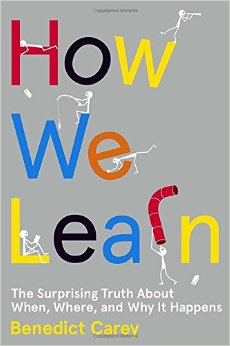'How We Learn' Encourages Distraction, Sleep To Help Learn More Efficiently
By Jaclyn Bauer in Arts & Entertainment on Sep 9, 2014 3:15PM
 How We Learn: The Surprising Truth of When, Where, and Why It Happens is Benedict Carey’s protestation against traditional conceptions of what it means to learn and how best to be taught. The book, released today, gathers, organizes and presents a host of contemporary and traditional theories on learning.
How We Learn: The Surprising Truth of When, Where, and Why It Happens is Benedict Carey’s protestation against traditional conceptions of what it means to learn and how best to be taught. The book, released today, gathers, organizes and presents a host of contemporary and traditional theories on learning.
Carey attempts to dispense with the mythology built around knowledge acquisition: namely, the strict ideas of what it means to study, to learn and to be smart. He does this by tracing a variety of both scientific and psychological findings involving education, cognition and memory up through the modern day.
“Learning,” Carey asserts, “is not all self-discipline” as he himself once thought it was, nor is intelligence merely an inheritance. Carey maintains that anyone can be knowledgeable about any subject, more so if they go about absorbing that knowledge in the myriad ways Carey lays out in his book. Among the various techniques he offers, Carey suggests breaking routine, studying the same material in different environments, taking periodic breaks and sleeping.
Sleep, Carey stresses, is not only important for cognitive function in general but it “also plays a critical role in flagging and storing important memories.” Carey goes on to argue that sleep is necessary in the process of forgetting, which is also essential for memorization and learning. That is, we must sleep in order to dispense with the unneeded and unimportant memories of the day. This, in turn, allows us to solidify the knowledge and memories that are important.
Though dense with case studies, exercises and sometimes dry scientific findings, Carey’s book is an insightful and practical guide on how to become a more cognizant and active learner. “Brilliance is an idol, a meaningless projection, not a real goal,” Carey reminds readers. Carey encourages readers to step back from the self-imposed ideas of perfection and to step into the self-directed realm of non-traditional learning.